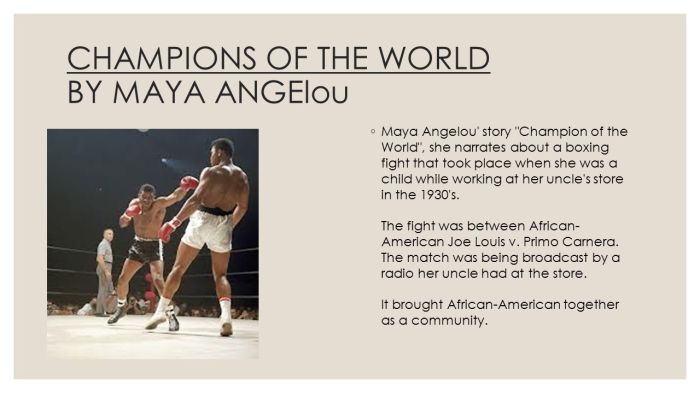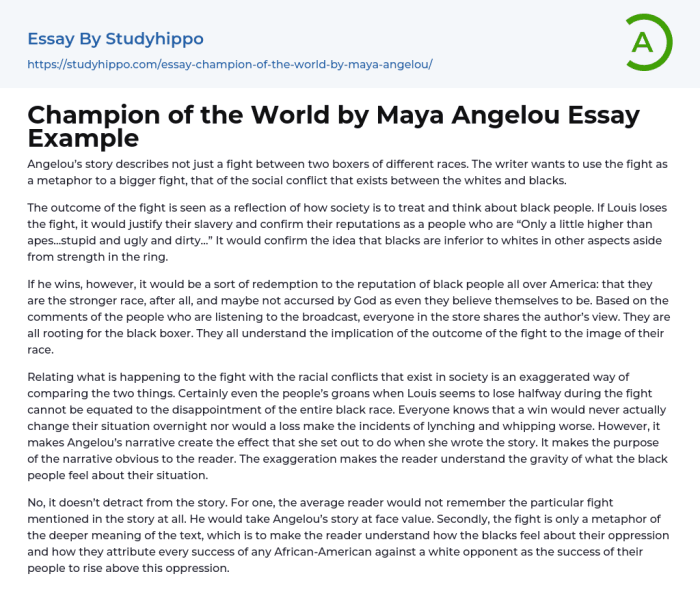Champion of the world maya angelou – Champion of the World: Maya Angelou’s Enduring Legacy of Identity, Resilience, and Empowerment invites readers to explore the profound impact of Maya Angelou’s iconic poem, “Champion of the World,” on literature, civil rights, and contemporary society. This seminal work, a testament to Angelou’s extraordinary life and activism, continues to inspire and empower individuals worldwide, leaving an indelible mark on the cultural landscape.
Delving into the poem’s intricate tapestry, we uncover the central themes of identity, resilience, and overcoming adversity. Angelou’s skillful use of metaphors and imagery vividly conveys the speaker’s emotional journey, while the poem’s structure reinforces its powerful message of self-acceptance and triumph.
1. Introduction

Maya Angelou, a renowned poet, author, and civil rights activist, has left an indelible mark on literature and society. Her most famous work, “I Know Why the Caged Bird Sings,” has been widely acclaimed for its unflinching portrayal of her childhood experiences and its exploration of themes such as race, identity, and resilience.
2. “Champion of the World” Poem Analysis: Champion Of The World Maya Angelou

Central Themes
The poem “Champion of the World” delves into the universal themes of identity, resilience, and overcoming adversity. Angelou explores the speaker’s struggle to reconcile her own sense of worth with the expectations and limitations imposed by society.
Metaphors and Imagery
Angelou employs powerful metaphors and imagery to convey the speaker’s emotions and experiences. The “cage” represents the societal constraints that stifle the speaker’s true self, while the “champion” symbolizes the inner strength and resilience that allows her to overcome these challenges.
Structure
The poem’s structure is deliberate and effective. The short, choppy lines create a sense of urgency and convey the speaker’s emotional turmoil. The use of repetition and refrain emphasizes the speaker’s determination and resilience.
3. Maya Angelou’s Legacy
Biography, Champion of the world maya angelou
Maya Angelou was born in 1928 in St. Louis, Missouri. She rose to prominence during the Civil Rights Movement, using her voice and writing to advocate for social justice and equality. Angelou’s works have been translated into over 30 languages and have received numerous awards, including the Pulitzer Prize and the National Medal of Arts.
Influence
Angelou’s legacy extends beyond her literary achievements. She has been a role model for countless individuals, inspiring them to embrace their own identities, overcome adversity, and strive for a more just and equitable society.
4. Cultural Impact of “Champion of the World”
Reception and Critical Acclaim
Upon its publication, “Champion of the World” received widespread critical acclaim. It was praised for its powerful message, evocative language, and its ability to resonate with readers from all backgrounds.
Interpretation and Usage
The poem has been interpreted and used in various contexts, including education, social justice movements, and popular media. It has become a symbol of empowerment, resilience, and the human spirit’s ability to triumph over adversity.
Enduring Relevance
Today, “Champion of the World” remains a powerful and relevant work. Its themes of identity, resilience, and overcoming adversity continue to resonate with contemporary readers, making it an enduring testament to Maya Angelou’s literary genius.
FAQ Guide
What is the significance of Maya Angelou’s poem, “Champion of the World”?
Maya Angelou’s “Champion of the World” explores the themes of identity, resilience, and overcoming adversity, offering a powerful message of self-acceptance and triumph.
How has Maya Angelou’s work influenced literature and society?
Maya Angelou’s writings, including “Champion of the World,” have had a profound impact on literature, civil rights, and popular culture, inspiring and empowering individuals worldwide.
What is Maya Angelou’s legacy as a civil rights activist?
Maya Angelou was a staunch advocate for civil rights and social justice, using her voice and platform to challenge racism, discrimination, and inequality.